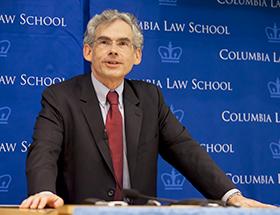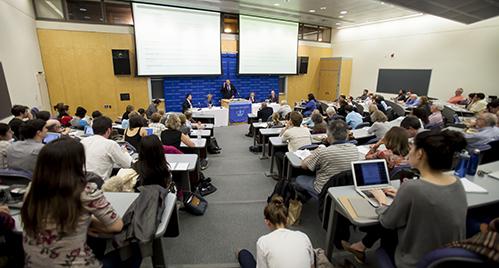Debating Divestment
Investment Experts Weigh In On Whether Divesting from Fossil Fuel Stocks Can Help Combat Climate Change.
New York, December 5, 2014—To divest, or not to divest—that is the question spurring a fierce debate among investors concerned about climate change.
Supporters contend that divestment from fossil fuels can cast a shadow on dirty energy and build momentum for renewables and efficiency, while opponents argue that maximizing the return from investment better helps institutions to pursue their goals, and that active shareholders can best influence corporate decisions.
Supporters contend that divestment from fossil fuels can cast a shadow on dirty energy and build momentum for renewables and efficiency, while opponents argue that maximizing the return from investment better helps institutions to pursue their goals, and that active shareholders can best influence corporate decisions.
| Professor Michael B. Gerrard, director of the Sabin Center for Climate Change Law |
A diverse lineup of investment experts hashed out the issues in a Nov. 24 panel discussion at Columbia Law School. The event was moderated by Michael B. Gerrard, Andrew Sabin Professor of Professional Practice and director of the Sabin Center for Climate Change Law.
“We need to better understand the competing considerations that inform decisions on divestment,” said Gerrard in introducing the panel, which drew a large audience that included Columbia University President Lee C. Bollinger ’71.
The first speaker was Stephen Heintz, president of the Rockefeller Brothers Fund, which rocked the philanthropy world this fall by announcing plans to divest from fossil fuel investments. Heintz said that, while the fund is a values-oriented institution that reached its decision in part for moral reasons, he also believes that renewable energy is a smart investment that will inevitably eclipse fossil fuels.
“We need to better understand the competing considerations that inform decisions on divestment,” said Gerrard in introducing the panel, which drew a large audience that included Columbia University President Lee C. Bollinger ’71.
The first speaker was Stephen Heintz, president of the Rockefeller Brothers Fund, which rocked the philanthropy world this fall by announcing plans to divest from fossil fuel investments. Heintz said that, while the fund is a values-oriented institution that reached its decision in part for moral reasons, he also believes that renewable energy is a smart investment that will inevitably eclipse fossil fuels.
“We wanted to demonstrate that you can divest and still make your investment and financial goals,” Heintz said. “This is about opening up a new dimension of debate, and exploring what actions are available to investors, not so much the impact of our particular holdings.”
Offering a very different perspective was Christianna Wood, president and chief executive officer of Gore Creek Capital and a veteran of previous divestment efforts on issues including tobacco. Acknowledging the seriousness of the climate challenge and calling for decisive global action, she argued that divestment damages financial portfolios and prevents constructive engagement that helps companies adopt better environmental practices.
Offering a very different perspective was Christianna Wood, president and chief executive officer of Gore Creek Capital and a veteran of previous divestment efforts on issues including tobacco. Acknowledging the seriousness of the climate challenge and calling for decisive global action, she argued that divestment damages financial portfolios and prevents constructive engagement that helps companies adopt better environmental practices.
“You lose your right to a voice that you have owning part of the company, and the shares end up in the hands of people who fundamentally don’t care about the issue,” Wood said, contending that only governments can solve the problem of climate change. “Divestment is a blunt instrument incapable of remedying anything.”
Wood added that university endowments and private funds, which cover crucial expenditures ranging from financial aid to health care and pension plans, operate with less room for error than mission-driven philanthropies.
| (l-r) Stephen Heintz, president of the Rockefeller Brothers Fund; Christianna Wood, president and CEO of Gore Creek Capital; Bennett Freeman, senior vice president for sustainability research and policy at Calvert Investments; and Dr. Bruce Kahn, a portfolio manager at Sustainable Insight Capital Management. |
Bennett Freeman, senior vice president for sustainability research and policy at Calvert Investments, agreed that divestment has limitations, but argued against an all or nothing strategy.
“Divestment at this point is more clearly a political statement than a way to make immediate economic change, but there’s a place for that,” Freeman said, warning against inaction. “Active ownership with engagement with companies, states, and international actors is a promising approach as well. They are two sides of the same coin, going right after the problem.”
Dr. Bruce M. Kahn, a portfolio manager at Sustainable Insight Capital Management and lecturer in the sustainability management program at Columbia University’s Earth Institute, presented data on the recent performance of the S&P 500 indicating lower returns when capital is shifted from fossil fuel related stocks and spread indiscriminately among other investments.
“You have to understand the risks you take when you make decisions, and consider the ramifications of your actions,” Kahn said. “For investors it’s not really about divesting, but about actively creating a different investment strategy.”
Panelists also took questions from Gerrard and the audience, including representatives from Barnard Columbia Divest for Climate Justice.
Generously supported by the David Sive Memorial Fund, the panel was sponsored by the Sabin Center for Climate Change Law, the Earth Institute, the Columbia Center on Sustainable Investment, Columbia Law School’s Environmental Law Clinic, and the Environmental Law Society.


